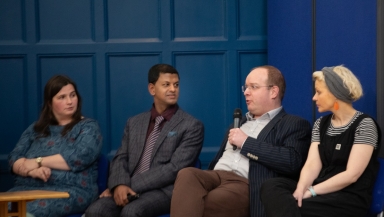
Scotland was once a world leader in education, thanks in large part to the Church of Scotland and the vision of Scottish Reformer, John Knox, who dreamed of a school in every parish. Fast forward to today and Scottish education is continuing its tragic downward spiral under the ruinous leadership of the SNP.
It is not only educational performance that is suffering, however. What is even more tragic is the dangerous ideologies and behaviours being peddled across Scottish schools and even in nurseries - not so much education as a form of ‘activism’ in which contested issues like gender ideology are passed off as fact.
It is little wonder that as things currently stand, for some Christian parents state education just isn’t an option. A few dozen such parents and Christian educators came together in Edinburgh for the Unite for Education conference last weekend to encourage one another and share the vision for a “Christ-centred education”.
The group is not homogenous. For some, the end goal is for all Christian children to attend a Christian school. For others, it’s about working with and within state schools to share the Gospel there, and support and advocate for a moral and biblically-based education that gives children the chance to learn about God and Jesus Christ. Others have decided to homeschool their children using a Christian syllabus, and support other parents in doing the same. Niel Deepnarain, founder of Unite for Education and conference organiser, is passionate about supporting Christ-centred education whether that is in Christian schools, at home, or in state schools.
What this group shares, however, is a passion for children being raised and educated in a way that gives them the freedom to know and follow Christ. Furthermore, there is the strong sense that something has gone wrong with the modern education system in Scotland and that the Church must work together to turn things around and provide Christian parents - and teachers - with options.
Joe Barnard, lead pastor of Holyrood Evangelical Church in Edinburgh, where the conference was hosted, summed up the tragic state of affairs when he likened the spiritual state of Scotland today to another Dark Ages. Originally from the States, Barnard has pastored in Scotland for over 10 years and has homeschooled all four of his children during this time.
“I can’t honestly think of a worse spiritual environment for youth to grow up in than modern Scotland in the 21st century, what with the effect of secularism, mass culture, technology, the focus on self, the effect of statism, [and] the deconstruction of the family. This isn’t just post-Christianity, this really is what the Bible talks about as a kind of exile,” he said.
Megan Patterson, Chair of Christian Vision for Education Scotland (CVE), spelled out some of the issues: “We’re asking our young people to choose who they are - that’s stressful. It’s not only about gender. Children are being asked to be adults before they have even reached adulthood. That blurring of childhood and adulthood is creating stress.”
The tragedy of modern Scotland is that millions of children are now growing up not going to church, and having very little exposure to Christianity in schools. All the while being exposed to other ideologies in the classroom as the Scottish government seeks to "embed" LGBT across the curriculum - Deepnarain likened the promotion of controversial gender ideology in Scottish schools to “product placement”.

Pastor Barnard sees another problem - that so many Scottish Christians “refuse to admit how toxic Scotland is for youth”. Beth Sayers, who works for the homeschooling group Classical Conversations, commented, saying, "We are people of the narrow way and yet so often we walk the broad way when it comes to education because it's what we know."
In such an environment, the Church undoubtedly has an important role to play in creating spaces where children can learn and grow up in the light of the Gospel, but for Barnard it goes beyond that. He believes that if the likes of John Knox or Scottish educational pioneer Thomas Chalmers were still walking among us today, they might even say that the priority for the 21st Church is “education, education, education”. In fact, Barnard would go as far as to say that in the present climate, education has become “more important than church planting”.
“The Church cannot move forward with church planting or witnessing or any other endeavour unless we take care of the kids that are our future,” he said, adding that “great leaders are formed young”.
The Edinburgh pastor has a suggestion for how the status quo can be fixed: “The answer’s not Sunday school, the answer’s not summer camp, the answer’s not leadership programmes for people in their 20s and 30s. The answer comes much earlier. The answer comes by linking two of Jesus’ teachings: one, let the children come unto me; two, don’t bury your talents.
“What is the greatest talent the Church has been given? There is so little we can do to influence the future. We really have one thing that we know will go into the future. That’s why the Psalmist speaks of children as arrows. They go further than we go in time, on the stage of history.
“So the greatest investment we can make in the future is to fulfil the Great Commission, starting by discipling our own children. Education is the responsibility of the Church. To give up on education is to give up on the Great Commission.”
The current state of affairs is driving some Christians to start the hard work of founding their own Christian schools. John-William Noble, pastor of Grace Baptist Church Aberdeen, has done just that with the launch of the Dóxa Theó independent Christian primary school.
“Even trying to train someone in this country to be a Christian teacher of any sort is very difficult - to near impossible - in the state context,” he admitted. Despite the challenges, the school opened its doors in January with 15 pupils, using the Classical Christian curriculum.
In Glasgow in 2014, Melville-Knox Christian School opened in a single classroom with a handful of students. Today it has 125 pupils across two campuses in the city and more branches have opened around the country. Former principal, Rev Stephen McCollum, sees the role of a Christian school as giving young people the tools they need to approach life from a biblical worldview. But he agrees that it is tough, which is why he says the first step in starting one is to get a group of parents together to pray for it.
“We know it’s a spiritual battle,” he said.
Starting a secondary school is especially hard, the conference heard - there is as yet no Christian high school in Scotland that covers all secondary years, although Melville-Knox will be extending its secondary provision to S4 from August.
“All Christian schools were a step of faith,” said one educator who has been involved in setting up a few.
It can be so hard that “some Christian educators walk away”, said another.
A recurring challenge brought up by conference speakers was a perceived lack of awareness among Christian parents that there are actually Christian schools, hubs and resources out there. Sayers was clear about what she most wanted Christian parents to know: “That we exist!”
Christian schools are not immune to practical issues like ensuring sustainable income streams and filling up classrooms, but as many of the schools don’t have big budgets, it can be hard to get the word out, making the recruitment of new students difficult and adding to the financial challenges. Labour’s VAT tax raid has made an already tough situation even tougher and two schools have already closed - the Cedars Christian school in Greenock and Kilgraston Catholic girls’ school.
And while there seems to be plenty of money to go around when it comes to promoting the LGBT agenda in schools, Christian schools can’t expect to get even one pound in support from the government, lamented Deepnarain - although some educators at the conference said they wouldn’t accept government funding on principle, even if it were available to them.
One mother-of-five who helped to set up the Melville-Knox school pleaded with the faithful - both parents and non-parents - to support Christian schools “because people need to have the choice to send their children to a Christian school”.
“We’re blessed in the central belt [of Scotland] that a lot of us do have the choice but up north there are so many families that are crying out for something. They are maybe not able to home educate - and there are family situations where, really, that feels impossible - and they need a school,” she said.
“It makes my heart bleed thinking of parents sending their children to a school that they don’t want to send them to but they have no choice. So to me, it’s every Christian’s responsibility to be supporting any work for God’s Kingdom that allows children to be educated in biblical truth.”
Homeschooling comes with its own set of difficulties for those who choose this path. One homeschooling mum said that it had been a financial struggle for her family and that she had spoken to a lot of other mums at church who wouldn’t even consider it for this very reason. She added, though: “It is a sacrifice, but I wouldn’t change it for the world.”
Sometimes the challenges have come in trying to develop homeschooling networks or hubs into something more formal. One homeschooling mum who has set up a network in her area shared, “There is so much red tape … You can have all these great ideas but then you run into legal matters that are a stumbling block.”

Joshua Kellard, of Banner of Truth, said that many homeschooling parents north and south of the border have been “fearing” this legislation and its “invasive” data requirements.
“Interestingly the bill only mentions the word ‘wellbeing’ twice. It is very much a bill designed to expand the state’s control,” he said.
“Essentially what we’re seeing is the state moving on two fronts, both to dominate the school arena by funnelling students into the state system, and on the other hand, extending its Ofsted-like powers to every household in England and Wales.”
Education is a devolved matter in Scotland so it would not be covered by this bill, but Kellard warned that this is “no time to be resting” as there is strong support for similar requirements to be introduced north of the border too.
“If it were the case that Westminster goes forward with these plans for a register, I believe we will see calls in the public sphere led by local authorities for the same to happen here,” he said.
Some speakers expressed disappointment and frustration at an apparent lack of interest and even “apathy” towards Christian education among both pastors and the wider Christian community.
Noble wants to see more parents choosing Christian education for their children to the point where it becomes the norm in churches, rather than a peripheral position among a few parents. He also wants to see a real partnership between school, family and church.
“These three pillars are very important if we’re going to have a right biblical foundation and a biblical outworking of Christian education,” he said.
“What we hope and pray for is that in time we would see churches being all the more equipped and at the helm [of Christian education]. It has more of a pioneering dimension in the present context.”
It’s not only children’s education that churches should be thinking about, though. The conference heard about the need for churches to care for the teachers in their midst too, many of whom are under incredible strain due to the nature of the job and the pressures of working in often secular environments that are not always friendly to their faith. Cases of talented and dedicated Christians losing their jobs in mainstream schools have become all too familiar in recent years, and many teachers are increasingly bearing the brunt of a breakdown in discipline and classroom behaviour, not to mention abusive parents.
Patterson is clear about what she wants churches to do: “Support teachers in the same way they’d support an overseas missionary - really support them!”
Nonetheless, it all comes back to the children and she believes that regardless of how things might look on the surface, they are desperately crying out to be taught the truth.
“When you think of Scotland’s children - no Christian parents, no church - we’ve got a lot of work to do,” said Patterson.
“Bear in mind that heartcry of Scotland’s children, unspoken perhaps, unheard by many, but they’re saying ‘teach me while my heart is tender’” - a reference to the bandcamp song by Judy Rogers, ‘Why Can’t I See God?’, which says:
"Teach me while my heart is tender.
Tell me all that I should know.
And even through the years I will remember.
No matter where I go!"
Although it seems like the light of the Gospel is growing dim in Scotland, there is indeed a remnant - a remnant that is praying and working for a better future for the nation’s children.
Said one proud mother and grandmother of 15 homeschooled children: “This is how we change a nation - one child at a time. Don’t think you can’t make a difference … Be strong, be convicted, and follow the Scriptures. Yes, it’s hard, it’s tough, but God is with you every step of the way.”













